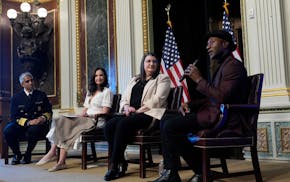If you read last year's "Philosophy: A Discovery in Comics," then you already know who Dutch cartoonist Margreet de Heer is. If not, you're in for a treat.
"Philosophy" explored the history and status of that field via comics, with our guides being cartoon avatars of Margreet herself, and her husband and partner, Yiri Kohl. Anyone who has ever taken a philosophy course knows what a minefield that particular discipline can be, yet De Heer and Kohl made it accessible, easily digested and — dare I say it? — fun.
Now they have tackled another difficult subject, with equal success. "Science: A Discovery in Comics" (NBM, $19.99) knocks that gigantic topic down to size, allowing easy understanding of even the most complicated of subjects. And not content with just the facts, De Heer tackles some subjective topics, like the often abrasive relationship between science and religion.
My first thought when reading both "Philosophy" and "Science" was how similar the sensibility was between those works and Larry Gonick's long-running "Cartoon History" series. But in an e-mail interview with De Heer, she acknowledged that she'd heard the comparison before — and feels "honored" — but had never actually seen Gonick's work. So where did all this fun come from? Here's what De Heer had to say:
Q: Who do you consider to be the natural audience for "Science"? Who would benefit most?
A: I guess probably anyone in the school system — from high school through college to university. I hope it helps connect the dots of all the separate subjects. I'm aiming for an insight in the broad picture — something I didn't start to get until I was 22.
Q: Your book makes science accessible and pleasant for all of us nonscience types. What was it like from your end? Did you re-experience high school science quizzes, or was it fun for you, too?
A: It was a lot more fun than school! I felt like I finally had an angle on the scientific subjects, something I never had as a student. Plus, there was no stress about examinations. I did show the book in the final stages to a team of knowledgeable people — a microbiologist, a math teacher, a physicist — and they found some minor inaccuracies and made some very helpful suggestions about stuff I left out or that was unclear. But this was a very welcome collaboration, not an examination at all. In the end, I felt like I had done a whole four-year university course in one year. I learned a lot, and enjoyed myself doing it. I hope other will people will also.
Q: What's next for you and Yiri?
A: At the moment we're working on a historical project about King Willem I of Holland for Museum Meermanno in the Hague. It's a wonderful break from making books, and I love the opportunity to work on something educational in the setting of a museum.
Eventually, I want to continue this series of "Discoveries in Comics" — we have done philosophy, science and religion (the latter one is not out in the U.S. yet, but maybe next year). I have ideas about a book about the brain, love, death — but also world domination. That last title will be about global politics, only from a very personal point of view: What would I do if I were boss of the world?

Photographer alleges he was forced to watch Megan Thee Stallion have sex and was unfairly fired
Phish fans are famously dedicated. What happens when they enter the Sphere?
Minneapolis will bid to host Sundance Film Festival

Icehouse on Eat Street in Mpls. facing eviction for unpaid rent
